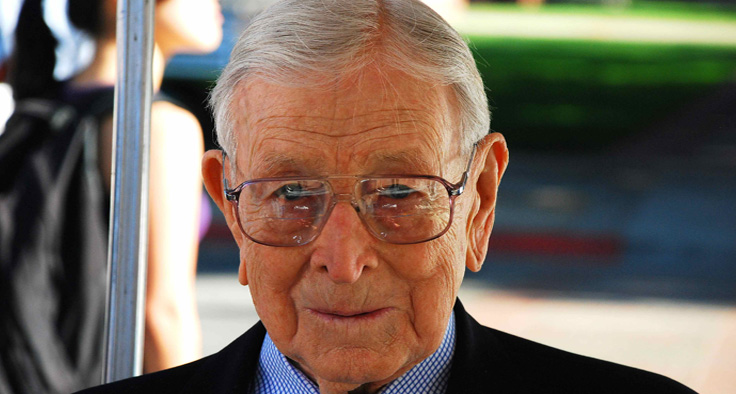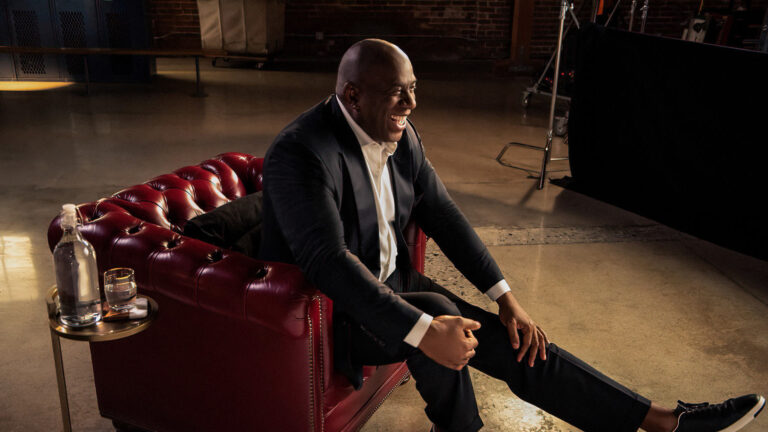John Wooden, UCLA basketball’s “Wizard of Westwood” has died at the age of 99.
The university said Wooden died of natural causes at Ronald Reagan UCLA Medical Center, where he had been hospitalized.
—–
As I drove through Westwood Hills and into the UCLA campus, I wondered about the man I was to see—John Wooden, one the most successful college basketball coach in the country.
Many coaches would consider it a dream come true to have—just once—the best college basketball team in America. During a period UCLA won 192 games, including 47 in a row, and lost 14.
As a sports fan, I knew about John Wooden the coach. I was curious about Wooden the man.
I parked near the Pauley Pavilion, a new five million dollar arena which winning Wooden teams had helped build. As I walked toward the administrative offices I remembered that for four years this campus was the home of Lew Alcindor (otherwise known as Kareem Abdul-Jabbar), that seven-foot, two-inch giant who dominated three of Wooden’s championship teams and became one of professional basketball’s greatest stars.
In a series of articles Alcindor had given me some insights into John Wooden—his intense conditioning program, his “antiseptic needle” (clean but incisive criticism), his rules about short hair, his insistence on academic as well as athletic excellence.
Some UCLA players grumbled about these rules, according to Alcindor, and felt that the coach was trying to make them prototypes of his own Horatio Alger, rural-America, Christian upbringing. During one game in the 1968-69 season, Coach Wooden had planned to insert into the lineup a player named Bill Sweek, but for reasons of strategy changed his mind. Sweek, angry at being left out, walked off the court.
After the game the coach lit into Sweek for his violation of team discipline. In the hot exchange which followed, the young man blurted out his suspicion: Wooden, he felt, gave preferential treatment to players who conformed to his image of the wholesome All-American boy.
According to Alcindor, the whole team was tense and upset when Coach Wooden gathered them together at practice the next day. Most expected Sweek to be dropped from the team. Wooden surprised them. “None of us is too old to change,” he said. “I’m going to try to understand you better from now on.”
Sweek apologized for his insubordination and the two shook hands. According to Alcindor, “From then on we were a closer bunch of human beings. When we went on to win our third straight national championship, I wasn’t as impressed by this victory as I was by the way a group of very different men had come together in tolerance and affection.”
My first impression of John Wooden was of a soft-spoken, scholarly looking man. When I was seated by his desk, I asked him about the Sweek incident.
The coach studied me with clear, direct eyes. “The incident was blown up a bit,” he said mildly. “The social issues and other matters are tearing some players apart inside; you just can’t treat them all the same. And yes, it’s true, I’m learning to understand their differences.”
He paused a moment. “Bill Sweek is a fine young man. He wrote me to say that he was going into the ministry.”
Between incoming telephone calls, the coach answered questions about his boyhood years on a farm outside Martinsville, Indiana, and spoke of his father, Joshua Hugh Wooden, a man who never achieved material success, but was a “great person.”
When young John Wooden went out for basketball in grade school, there was no money for basketball uniforms, so each boy had to buy his own jersey and shoes. “I often played with my jersey on top of my overalls,” Wooden recalled.
“Our coach and school principal was Earl Warriner. He taught me a lot more than just basketball. One morning he told us that a game had been arranged for that afternoon. Now I was the team’s top scorer and was getting a big head about it all. On this particular day I had left my shoes and jersey home, so I told the coach he’d have to excuse me from classes early to go home and get them. ‘Or else I won’t be able to play.’ Mr. Warriner looked at me quietly for a moment and said, ‘That’s too bad, isn’t it, Johnny? We’ll sure miss you.’
“Well, I was pretty shaken by this. When school let out, I found a way to get home in a hurry, grab my jersey and shoes and be back in school before the game started. Coach Warriner paid no attention to me. I did not play—and we lost. After the game he put his arm on my shoulder and said, ‘Johnny, we could have won with you in there, but winning just isn’t that important.'”
“That must have cut your ego some,” I said.
“Yes, it did. And it taught me that you don’t have good team spirit if one player thinks he should get special favors.”
As the coach talked I began searching my memory. He reminded me of someone. But who?
“When I was in high school,” Wooden continued, “one of my teachers—Mr. L. J. Shidler—asked us one day in class to write out our definition of success. Mine, like most of them I guess, had to do with power, status and material possessions. Mr. Shidler was very disappointed in my answer. He told me that to him ‘success is that peace of mind which comes from knowing you’ve done everything in your power to become the best that you are capable of becoming.’ I’ve never forgotten that.
Later Mr. Glenn Curtis, my high school basketball coach, used what he called a ‘ladder of achievement’—listing qualities like enthusiasm, loyalty, team spirit—to inspire us to play better. I’ve used ideas from those men, from my father and from Ward ‘Piggie’ Lambert, my coach at Purdue, and added a few of my own to make a chart I call ‘The Pyramid of Success,’ which I use in my coaching.”
John Wooden went from high school to Purdue University in the early 1930s, where he won All-America honors. He worked hard to make college expenses, digging sewers one summer, waiting on tables and selling sandwiches. After graduation he played professional basketball for a while before starting a career as English teacher, then on into coaching.
Since basketball today is a continuous 40-minute flow of running, jumping, sprawling players who can move fans—and coaches—into a frenzy of emotion, I asked Coach Wooden how he kept from becoming an ulcer-ridden insomniac. To my surprise he began to talk about poetry and its therapy for times of tension.
“From boyhood I’ve memorized great writings of all kinds,” Coach Wooden said. “Doing this feeds my soul. I’ll be driving along a freeway, upset about a practice session, or concerned about a player, when out of the depths will come some verse I memorized years ago. Repeating it lifts my spirit, and sometimes it will even give me an answer to what’s troubling me.”
“And that’s how you keep calm during a game?”
“Yes, and—and with this.” He took out his wallet and removed a small aluminum cross. “I often keep this in the palm of my hand during a game. It will help prevent me from jumping up and shouting at the referee. It also reminds me that basketball is not the most important thing.
“Mind you, I sometimes lose sight of this. I’ve yelled at officials and gone and apologized to them later. Plenty of times I’ve been ashamed at the way I’ve needled players on the other team.”
A call came and Coach Wooden excused himself for a moment, leaving me his brown, zippered notebook to leaf through. There were special prayers, page after page of verse—all neatly typed. Then I came to some notes of a speech he had given to a boys club:
“It is a great experience to be an athlete, to test your skills against the best, to achieve records,” he had told this group. “But there is One who is not very much impressed by all this, or by your sports car or your fancy clothes…. We are on an aimless course which goes around in circles and ends nowhere until we win the real victory. And the life that wins the real victory is the one which places itself totally in the hands of the Lord Jesus Christ.”
When I said goodbye to John Wooden, I realized who he had reminded me of—Guy Baker, my coach back in the 1930s at Bigelow Junior High in Newton, Massachusetts. Mr. Baker also cared about his boys and the character each was forming. Once he caught me in a lie and kept me out of a baseball game. At the time I was devastated, but the lesson in honesty stuck.
Thank you, Guy Baker and Earl Warriner and L. J. Shidler and Piggie Lambert and Glenn Curtis and John Wooden—and all you teachers of boys and molders of men. Thank you for what you have given to all of us.



